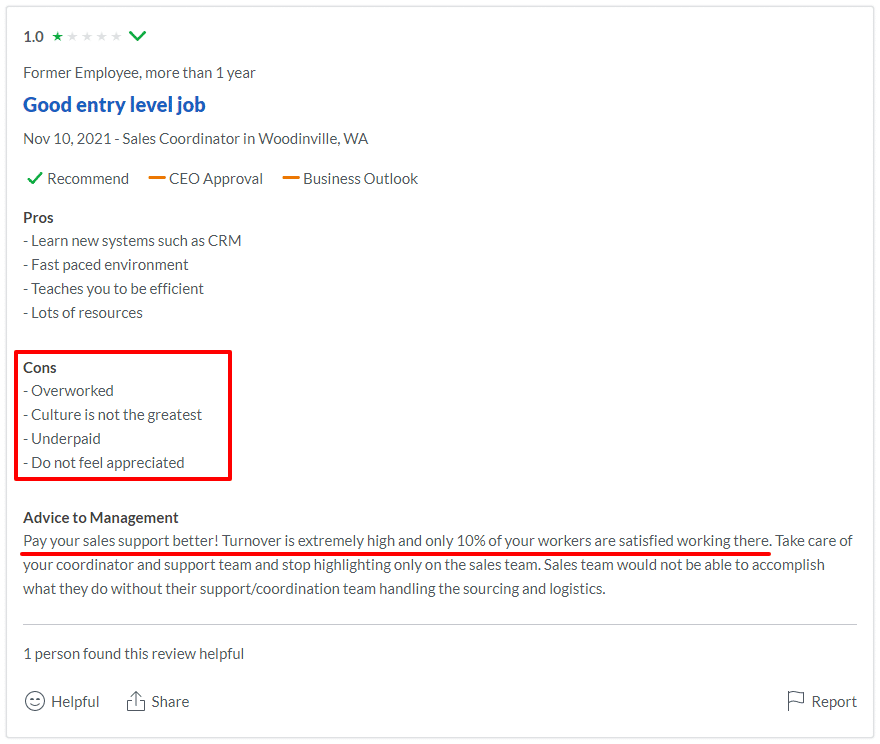Is Glassdoor really all that important for your business?
It seems like a ‘nice-to-have.’
Glassdoor is a website where current and former employees anonymously review their employers. Many believe that Glassdoor is an essential part of running a successful business. Their rationale goes like this: If your company has (or has had) employees, you should be on Glassdoor.
Are they right?
As you’ll soon see, Glassdoor is a two-edged sword; it’s powerful in the hands of an experienced pro who’s willing to do the work to build a wonderful business and destructive in the hands of those looking to game the system.
Why Glassdoor is essential to your organization
Wyatt Troia, a software engineer, left two scathing reviews for his employers in 2020, “The founders are not skilled nor experienced leaders, with a bias towards pettiness and cowardice,” he wrote.
He followed up by posting more negative reviews on Glassdoor.
Things escalated from there.
His employer responded by firing him; they also withheld stock options promised to Troia during the hiring process. He was initially promised that these options would vest within a year but later found that they wouldn’t vest until 16 months of employment.
This cost Troia more than $100,000.
Then Troia’s former company filed a lawsuit against him. In their suit, they alleged that Troia purchased Google ads to target their company and steer potential hires towards their negative reviews.
What’s the big deal? This is par for the course; this is the risk you take when you write a negative review.
Does Troia’s story matter?
Glassdoor impacts an employer’s ability to attract future employees.
How do we know their platform is important?
- Worried employees post questions on Q&A site Quora, asking if they can be fired for writing a negative review on Glassdoor
- Glassdoor offers businesses advice in their help section, showing businesses what they can do to deal with negative reviews from current and former employees
- Concerned employees ask Glassdoor if they’ll protect their identity if an employer takes legal action against the reviewer
- Companies manipulate and boost their Glassdoor ratings by manipulating, threatening, and bullying their employees
- This (unnamed) company sent a former employee a legal letter for their Glassdoor review, threatening to sue if they didn’t take it down
What’s the common thread with all of these?
All of these people, companies are behaving in a way that implicitly acknowledges the incredible value of Glassdoor. If Glassdoor reviews didn’t have a significant impact, companies wouldn’t be threatening to sue their employees over it. Former employees wouldn’t be terrified to share their feedback.
A strong review portfolio on Glassdoor is a kingmaker.
Here are some stats on employee branding from Glassdoor for Employers.
- Glassdoor and Indeed (via their partnership) reach over 80 percent of online job seekers in the U.S
- Glassdoor job seekers who saw one company’s brand 10+ times were 5x more likely to apply than those who saw it once
- 62 percent of Glassdoor users are more likely to respond to a recruiter from a company that they recognize than from a company they don’t recognize
- 76 percent of Glassdoor users state their perception of a company improves after seeing an employer respond to a review
- 79 percent 4 in 5 Glassdoor users are more likely to apply to an open job if the employer is active on Glassdoor (e.g., responds to reviews, updates their profile, shares updates on the culture and work environment)
- 65 percent of Glassdoor users read at least five reviews before forming an opinion of a company
- 89 percent of Glassdoor users find the employer perspective important on what it’s like to work at the company
Okay, that’s kind of compelling. But it really doesn’t say anything about how this will affect your company specifically. Let’s look at some more data, this time from LinkedIn.
According to LinkedIn’s ultimate guide to brand statistics, employer branding produces a…
50 percent increase in qualified candidates
50 percent cost-to-hire reduction
1 – 2x faster time-to-hire
28 percent reduction in mis-hire and employee turnover
What’s employer branding again?
Employer branding is an extension of your company’s reputation. If you’ve done a good job with employer branding, you’re able to answer four stressful questions in a candidate’s mind.
- What does this company stand for?
- Am I safe at this company?
- Will they treat me well?
- Do I have a future here?
Your reputation, via employee reviews, answers this question objectively in their minds. Candidates can gain objective evidence via employees and their experiences.
How to attract top talent using Glassdoor and recruitment marketing
Glassdoor is a powerful tool in the right hands.
We’ll need to define our metrics and KPIs before we can attract candidates on the cheap. Data from Employer Brand International’s (EBI) Global Research Study outlines a few common ROI metrics and data used to analyze an employer’s brand.
These metrics and KPIs enable your company to measure performance across a variety of data points, including:
- Number of applicants
- Cost of hire
- Quality of hire
- Employee retention rate
If you’re working to improve the culture and satisfaction of your employees, it’ll be easy to improve your aggregate star rating on Glassdoor. It’s important to pursue this — it’s a helpful barometer that shows whether you’re on target with employees (or not).
Here are some steps you can take to improve performance across the four metrics I’ve mentioned.
Step #1: Start with values
According to Jeff Lawson, chief executive at Twilio, your culture is living values; here’s how you apply it. First, write your values down; make them available to everyone in your firm. Next, you create a culture when everyone works together to live these values out in their day-to-day work life.
Here’s the thing.
If you want this whole values thing to be successful, it can’t be a top-down affair. Management can’t dictate the values of the organization.
That’s not how this works.
Healthy organizations develop their values from the inside out. The tribe, you + your employees, work together to discover your organization’s values.
Why does this matter?
Your employees will discuss these values and the culture of your organization in their reviews.
Take a look.

If you want exceptional reviews from happy employees and top-tier candidates applying to work at your company, this is where you start. If you’re noticing any problems internally, you rework things so your employees see that you’re making a sincere effort.
This produces five-star employee reviews organically.
Step #2: Ask employees to share their feedback
Notice that I didn’t say ‘ask for a review.’
Your employees shouldn’t feel coerced or backed into a corner here. You want them to share genuine and helpful feedback in their reviews.
No helping, coaching, or hinting.
Why is this so important?
Sites like Glassdoor and Indeed provide job candidates with the trusted third-party data they need to vet your company.
- 75 percent of candidates assess an employer’s brand before they even apply.
- 52 percent of candidates spend time on a company’s website, monitor their social media profiles (and often key employees) to get a sense of a prospective employer.
- Prospective candidates trust employee reviews 3x more than company statements.
If you’ve built a strong and healthy culture, these positive reviews (and a few negatives) will begin to come in. Respond to each review respectfully and fix the mistakes discussed in your negative reviews. Continue to request feedback from new and outgoing employees.
Step #3: Find top tier candidates on the cheap
Sophisticated recruiters rely on the hidden job market to attract top candidates on the cheap? How do they do this consistently when Fortune 500 companies struggle?
They rely primarily on the hidden job market.
The hidden job market consists of all of the available jobs that are not posted publicly; only 20 to 39 percent of all the jobs that exist are posted publicly. That means 61 to 80 percent of all job opportunities are hidden.
These roles are filled via networking.
Bill Todd, former CEO and founder of The Companies Expert, explains how the hidden job market works.
Here’s why this is essential.
1. An abundance of opportunity. There are far more opportunities available in the hidden job market.
2. There’s far less competition: Public job posts receive 100 – 250 responses. Hidden job market posts, 5 – 10.
3. Growth and promotion are easier: You were brought in via networking; you can use it to get ahead.
If you’re looking to attract top-tier candidates, you can use a simple strategy to tap into the hidden job market.
It’s employee advocacy.
Employee advocacy is employee-led, company promotion. An employee advocate is a staff member who:
• Recruits top tier employees to your company
• Promotes your company’s products and services to people in their social circle
• Acts in your company’s best interests
• Functions as a thought leader, product, service, or subject-matter expert
Employee advocates are extremely valuable. They have a significant impact on marketing, sales, and recruitment due to their reach. If your company has the right set of employee advocates, you can draw incredibly talented people into your organization on the cheap.
How do you get employees to advocate on your behalf?
That’s the easy part.
You pay them.
Dr. Bradford Smart, Ph.D., creator of Topgrading, shares a really simple strategy you can use to motivate your employee advocates.
- Pay your employee advocates: If an employee is still with the company after six months, you pay both your employee advocate and your referral $1,000. This is a bargain when you realize the average cost of hiring a new employee is $4,129 via public channels.
- Have managers refer top-performing candidates: When you hire a new manager or supervisor, ask them to sit down and create a list of the best performing subordinates in their previous company. If you make this a regular part of your onboarding process, finding top-tier candidates is so much easier.
This is how you attract top-tier candidates at a steep discount via the hidden job market. The best part about all of this? There’s less competition for their attention, so that means you won’t be sucked into a bidding war.
All of this hinges on Glassdoor and Indeed.
If prospective candidates see your review portfolio is filled with one and two-star reviews from current and former employees, this isn’t going to work. These top candidates won’t give your company the time of day.
Would you?
If you want these strategies to work, you’ll need to sort things out inside your company first, generate positive reviews, then pursue candidates in the hidden job market.
The Glassdoor effect is a life or death struggle
The survival of your company depends on it.
It may seem like a ‘nice-to-have, but it really isn’t. Glassdoor is an essential website for your company. It’s a two-edged sword, one that’s powerful in the hands of an experienced pro and destructive in the hands of schemers.
As we’ve seen, Glassdoor controls your ability to attract future employees.
A strong review portfolio on Glassdoor is a kingmaker. With consistent effort, you’ll find you’re able to attract top-tier job candidates on the cheap; whether your reviews are positive or negative, no lawsuits needed.



